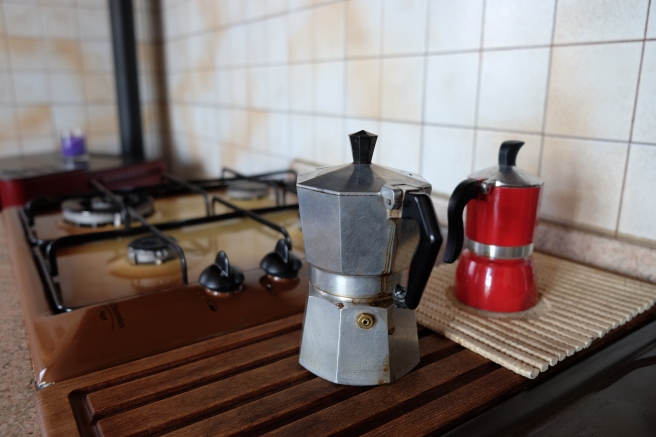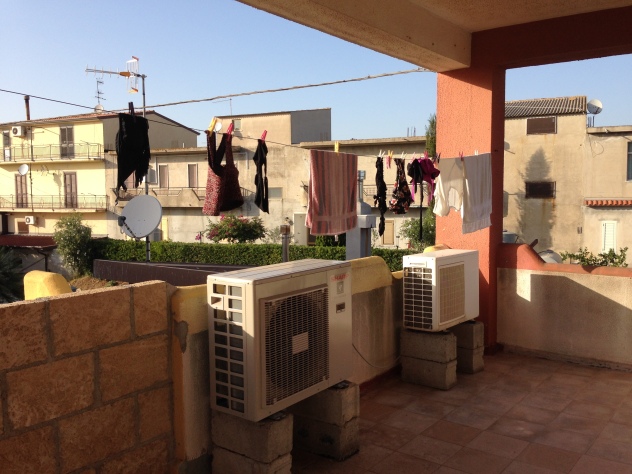No matter how hard you study, there will always be some parts of a language that you won’t be able to capture without living where it is actually used. Raised north of the Alps, I have always struggled to grasp certain nuances of my second language Italian (and pretty much everything about its grammar, but that’s a different story). It wasn’t until I went to live in Italy for a few months that I got a little closer to the art of expression that the Italians call their language – and that I finally cracked the one I’d been racking my brains about all my life. About the most Italian of words.

I was fortunate to be born into a family of two cultures and languages, but despite having learned both German and Italian growing up, I can only call one of them really my own. When I went to intern at a cultural institution near Florence for a few months to teach German to school kids, my language skills were in for a dramatic improvement.
Having spoken Italian exclusively to family members all my life, I was challenged with the linguistic necessities outside the private sphere of home for the first time ever. Due to my job, the people I interacted with most were children, obviously. Right after that came folks my age due to, you know, me being folk my age.
Now I don’t know if you ever noticed, but your regular elementary school kid and just about any 20-something-year-old have very… different approaches to their mother language. Being exposed to these diametrically opposed sets of vocabulary has broadened my linguistic horizons in the strangest way – or you could also say: My skills have increased exponentially at the far ends of classroom and bar talk, but are still flat as a pancake in the section where you speak to normal people in a normal setting (on the phone, in the supermarket, you name it).

As for the kids’ vocabulary, I learned the terms for blackboard, chalk, pencil case, also snowman, sandcastle, playground, slide and swing. I could have easily learned all these from my cousins as a kid, you think?, and yes, sure. But as they were more likely to beat me at card games than to call me names – there was a lot more I had to learn from elementary school kids.
Just to give a quick example here: It’s not very promising when you first have to ask for the meaning of deficiente and then tell a kid not to call their classmate it, let me tell you that.
I did have a lot to learn from my guys my age, too – for example the proper term for drunk. Because sure, I had seen all my uncles get super pissed on tiny water glasses of red wine at the dinner table, but they’d never bothered to talk about how ubriachi they’d been over breakfast the next day.
Over the course of my stay, I could add more useful terms to my vocabulary: to make out, to fight, to hook up, to embarrass yourself (hopefully not in that order), lots of lovely grown-up insults and how to properly call someone a hottie.
But here’s where to contradictions started: I knew that an uccellino was a little birdie and could be used as an example in class, but that fare l’uccellino was something you do to not end up incinta with a little Italian bastard in your belly.
And yes, I learned that if the classroom was filthy, you could refer to sweeping it by using the term scopare – but then again, scopamici weren’t friends who clean the floor together (although you know, they might as well have to…).
But most importantly, I finally learned to deal with omnipresent term magari. Up to this point, on every family visit to Italy, I would wonder about this little word’s appearance in almost every sentence. I remember asking all my relatives for the meaning over and over again, but never really got a satisfying answer. Mostly, they just shrugged their shoulders and opened their palms to the ceiling in this typical Italian manner accompanied by the little ehh sound (another one you could write books about), then went on shouting in rapid Italian filled with lots of magaris.
I got frustrated with this word and looked it up online, but that didn’t help either. According to a dictionary, magari can mean anything from ‘certainly’ to ‘if only’, but also ‘perhaps’ and ‘even’, and let’s not forget ‘rather’, ‘although’, ‘possibly’ and ‘presumably’, and looking at that list it can probably mean any other thing you want it to.
At some point, I just decided to ignore this word forever, as all the sentences weirdly still seemed to make sense without it. Except… not quite.
But then I came to Italy and quickly realized that it was impossible to take no notice of the term, it’s just that much all over the place. At first, it felt like the term makes sentences mushy and takes the exactness away from them. It’s like:
Actual conversation:
Me: Are you coming tomorrow?
Person: Yeah, I will, magari.
Translation:
Me: Are you coming tomorrow?
Person: Yeah, I will, magari. So maybe. Actually yes, but not sure. Like, not that sure. Will see. Let’s have coffee.

It was driving me nuts in the beginning. MAKE STATEMENTS, PEOPLE! My German brain couldn’t take any of it. So instead, I decided to embrace the magari – or rather: let the magari embrace me. And then the magic happens. Apparently in Italy, you have to accept that everything can be magari and magari can be added to anything. It’s just as simple as that.
And when you start to accept the magariness of Italy, you love it. You said you would be here at 7? Why not magari that up to, let’s say, 8.30? Oh, that email someone wanted to send you yesterday? Yeah well, they said magari in the first place. What do you mean, they didn’t? Sorry, magari implied. And when you call your landlord to tell him that the heating is broken, you can be sure that he will magari take care of it today. If he did, the plumber will magari come tomorrow, and magari the water will be hot again (from my experience, he magari will leave a mess in your bathroom though).

When you’ve come to accept this as part of the culture you’re living it, statements no longer feel vague and blurry to you. Instead, it’s more like a little leeway that you leave for yourself just in case. It’s almost like a lens that you look through on all your surroundings. It’s the filter for life that turns the Italian experience into the real Italian experience. So when I go to Italy nowadays, I just put my magari on like a fancy pair of sunglasses that I can never rock like the Italians do, and enjoy the magari way of life.

What are you experiences with the Italian language? Do you have trouble dealing with one specific term like I did? Let me know in the comments!
Like it? Pin it!


This post is lovely. I’ve been trying to learn Italian for over a year now through Duolingo and it’s been the most exquisite experience so far. hope i get the chance to live in Italy as well later on and actually use the language.
LikeLiked by 1 person
Hi Calum, thanks very much for reading and taking the time to reach out to me, I’m glad you enjoyed the post! I’ve heard many good things about this program, but have never tried it myself yet. Hope you will continue to have fun with Italian and get to practice it in this amazing country when you’re ready! Good luck to you 🙂
LikeLiked by 1 person
Im in Italy right now. Grew up in the other part of the glob but i am here because my parents want me to stay here. It is hard for me to adjust especially because of the language. Mama mia! Can’t even practice speaking italian because i am afraid that they might not understand my italian. Hoping that I can speak Italian fluently soon, magari.
LikeLiked by 1 person
Globe*
LikeLike
Im in Italy right now. Grew up in the other part of the globe but i am here because my parents want me to stay here. It is hard for me to adjust especially because of the language. Mama mia! Can’t even practice speaking italian because i am afraid that they might not understand my italian. Hoping that I can speak Italian fluently soon, magari. Enjoyed reading your posts. I feel that I can relate to it. 💙
LikeLiked by 1 person
Thanks so much for reading and taking the time to comment! Hope you’re having a great time in Italy, I really miss living there. I get your point about the language and I know how hard it can be, but I think it’s best to not worry too much and just try talking because it’s the only way to improve. I have found that most Italians will love you just for trying, so it could be worth a shot 🙂 wishing you all the best luck and thanks again for reaching out!
LikeLike
I laughed so hard at everything! I mean, getting to the “magari” part of the Italian language and way wasn’t that hard for me coming from Latin culture, which an “orita” tends to work the same way as a “magari”. I totally can relate on coming from a different background and working only in Italian! great post!
LikeLiked by 1 person
Thank you for your comment Brenda! I’m glad you had some fun reading and that you could identify 🙂 It’s incredible, now I’ve learned another magari-like term, thank you 😀 Another lovely reader already shared a Portugese form of magari with me – I’m a little jeaulous that my mother tongue doesn’t have that!
LikeLike
I love this post! You really captured what it’s like learning a language and living in a place where you’re not quite sure of things. I’d never heard “magari” before, but my favorite Italian word is “allora!” I don’t actually know Italian, but I just love how much we heard it when there. It’s such a beautiful word, too. So I would just say it randomly and hope to blend in 🙂
LikeLiked by 1 person
Thank you for your comment Sarah, I appreciate it! Haha, you did a good job at blending in I believe, “allora” is also super Italian and can be used in different ways. Also it just sounds wonderful, you’re so right!
LikeLike